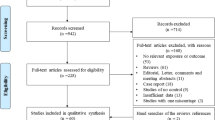Summary
p53 gene plays an important role in apoptosis, which is necessary for successful invasion of trophoblast cells. The change from an arginine (Arg) to a proline (Pro) at codon 72 can influence the biological activity of p53, which predisposes to an increased risk of recurrent spontaneous abortion (RSA). In order to investigate the association between p53 polymorphism at codon 72 and RSA, we conducted this meta-analysis. Pubmed, Embase and Web of science were used to identify the eligible studies. Odds ratio (OR) with 95% confidence interval (CI) was used to evaluate the strength of the association. Six studies containing 937 cases of RSA and 830 controls were included, and there was one study deviated from Hardy-Weinberg equilibrium (HWE). There was a significant association between p53 polymorphism at codon 72 and RSA in recessive model (Pro/Pro vs. Pro/Arg+Arg/Arg; OR=1.60, 95% CI: 1.14–2.24) and co-dominant model (Pro/Pro vs. Arg/Arg; OR=1.47, 95% CI: 1.02–2.12) whether the study that was deviated from HWE was eliminated or not. A significant association was observed in allelic model (Pro vs. Arg; OR=1.28, 95% CI: 1.04–1.57) after exclusion of the study that was deviated from HWE. No association was noted in recessive model (Pro/Pro+Pro/Arg vs. Arg/Arg; OR=1.05, 95% CI: 0.86–1.30) and co-dominant model (Pro/Arg vs. Arg/Arg; OR=0.96, 95% CI: 0.77–1.19). Subgroup analysis by ethnicity also indicated a significant association between p53 polymorphism at codon 72 and RSA in Caucasian group. No heterogeneity and publication bias were found. Our meta-analysis implied that p53 polymorphism at codon 72 carries high maternal risk of RSA.
Similar content being viewed by others
References
Pandey MK, Rani R, Agrawal S. An update in recurrent spontaneous abortion. Arch Gynecol Obstet, 2005, 272(2): 95–108
Vaiman D. Genetic regulation of recurrent spontaneous abortion in humans. Biomed J, 2015, 38(1): 11–24
Tsur A, Hughes GC, Shoenfeld Y, et al. Interdisciplinary exchange of ideas: progestagens for autoimmunity, biologics for pregnancy complications. Immunol Res, 2015, 61(1-2): 31–34
Galamb Á, Petho B, Fekete D, et al. Uterine anomalies in women with recurrent pregnancy loss. Orv Hetil, 2015, 156(27): 1081–1084
Jaslow CR, Carney JL, Kutteh WH, et al. Diagnostic factors identified in 1020 women with two versus three or more recurrent pregnancy losses. Fertil Steril, 2010, 93(4): 1234–1243
Firouzabadi RD, Ghasemi N, Rozbahani MA, et al. Associaion of p53 polymorphism with ICSI/IVF failure and re current pregnancy loss. Aust N Z J Obstet Gynaecol, 2009, 49(2): 216–219
Nair RR, Khanna A, Singh K. Association of FAS-1377 G>A and FAS-670 A>G functional polymorphisms of FAS gene of cell death pathway with recurrent early pregnancy loss risk. J Reprod Immunol, 2012, 93(2): 114–118
Cinar O, Kara F, Can A. Potential role of decidual apoptosis in the pathogenesis of miscarriages. Gynecol Endocrinol, 2012, 28(5): 382–385
Wei D, Wu Q, Shi H. Apoptosis and p53 expression in the placental villi of females with unexplained recurrent s pontaneous abortion. Exp Ther Med, 2014, 7(1): 191–194
Sakamuro D, Sabbatini P, White E, et al. The polyproline region of p53 is required to activate apoptosis but not growth arrest. Oncogene, 1997, 15(8): 887–898
Pietrowski D, Bettendorf H, Riener EK, et al. Recurrent pregnancy failure is associated with a polymorphism in the p53 tumour suppressor gene. Hum Reprod, 2005, 20(4): 848–851
Dumont P, Leu JI, Della Pietra ACIII, et al. The codon 72 polymorphic variants of p53 have markedly different apoptotic potential. Nat Genet, 2003, 33(3): 357–365
Coulam CB, Kay C, Jeyendran RS. Role of p53 codon 72 polymorphism in recurrent pregnancy loss. Reprod Biomed Online, 2006, 12(3): 378–382
Kaare M, Bützow R, Ulander VM, et al. Study of p53 gene mutations and placental expression in recurrent mis carriage cases. Reprod Biomed Online, 2009, 18(3): 430–435
Fraga LR, Dutra CG, Boquett JA, et al. P53 signaling pathway polymorphisms associated to recurrent pregnancy loss. Mol Biol Rep, 2014, 41(3): 1871–1877
Yoon SH, Choi YM, Kim JJ, et al. No association of p53 codon 72 polymorphism with idiopathic recurrent pregnancy loss in Korean population. Eur J Obstet Gynecol Reprod Biol, 2015, 192: 6–9
Sivaraman L, Conneely OM, Medina D, et al. P53 is a potential mediator of pregnancy and hormone-induced resistance to mammary carcinogenesis. Proc Natl Acad Sci USA, 2001, 98(22): 12379–12384
Cinar O, Kara F, Can A. Potential role of decidual apoptosis in the pathogenesis of miscarriages. Gynecol Endocrinol, 2012, 28(5): 382–385
Savion S, Lepsky E, Orenstein H, et al. Apoptosis in the uterus of mice with pregnancy loss. Am J Reprod Immunol, 2002, 47(2): 118–127
Su MT, Lin SH, Chen YC. Genetic association studies of angiogenesis and vasoconstriction-related genes in women with recurrent pregnancy loss: systematic review and meta-analysis. Hum Reprod Update, 2011, 17(6): 803–812
Tang W, Zhou X, Chan Y, et al. P53 codon 72 polymorphism and recurrent pregnancy loss: a meta-analysis. J Assist Reprod Genet, 2011, 28(10): 965–969
Chen H, Yang X, Wang Z. Association between p53 Arg72Pro polymorphism and recurrent pregnancy loss: an updated systematic review and meta-analysis. Reprod Biomed Online, 2015, 31(2): 149–153
Lledo B, Turienzo A, Ortiz JA, et al. Negative effect of P72 polymorphism on p53 gene in IVF outcome in patients with repeated implantation failure and pregnancy loss. J Assist Reprod Genet, 2014, 31(2): 169–172
Author information
Authors and Affiliations
Corresponding author
Additional information
This project was supported by The National Science and Technology Pillar of China program during the Twelfth Five-Year Plan Period (No. 2014BAI 05B05).
Rights and permissions
About this article
Cite this article
Zhang, Y., Wu, Yy., Qiao, Fy. et al. Association between p53 polymorphism at codon 72 and recurrent spontaneous abortion. J. Huazhong Univ. Sci. Technol. [Med. Sci.] 36, 402–405 (2016). https://doi.org/10.1007/s11596-016-1599-2
Received:
Revised:
Published:
Issue Date:
DOI: https://doi.org/10.1007/s11596-016-1599-2




